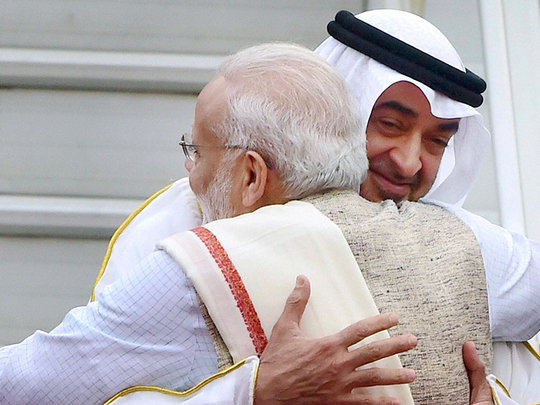
When His Highness Shaikh Mohammad Bin Zayed Al Nahyan, Crown Prince of Abu Dhabi and Deputy Supreme Commander of the UAE Armed Forces, takes his place as the chief guest during India’s colourful Republic Day parade on January 26, he will receive salutes not only from marching bands of Indian soldiers in their finest livery but also from a contingent of the UAE Armed Forces. For the UAE has become only the second country — after France — to be accorded the honour of having its troops march on this most symbolic of days in India’s national calendar.
This move in itself is indicative of just how close UAE-India relations have become in the past few years, especially after Prime Minister Narendra Modi’s visit to the country in 2015. Another barometer of the two countries’ increasing alignment on several issues is the fact that this will be Shaikh Mohammad’s second visit to India in less than a year; he was there just last February.
It has been a long journey of steadily growing official ties, ever since the late Shaikh Zayed Bin Sultan Al Nahyan laid the foundations with his state visit to India in 1975. Relations between the two countries have now taken the shape of what has been termed a ‘comprehensive strategic partnership’. And this bodes well for the wider region, too, as one of the aims is to confront issues that afflict multiple states.
At least 2.6 million Indians call the UAE home, constituting, by far, the single biggest community in the country. For India, the UAE is its third-largest trading partner — behind only China and the United States, and ahead of Saudi Arabia, the region’s largest economy. For the UAE, India is its largest trading partner.
Economic links
Trade between the two countries stood at $50 billion (Dh183.65 billion) in 2015, according to UAE ambassador to India Ahmad Al Banna. Indian exports of goods and commodities are expected to surge to $100 billion, and two-way trade exchange to $160 billion by 2030. This would make the UAE the largest-trade partner to India in the world — a far cry from 1971, when two-way trade was just $180 million.
The UAE is also the biggest Arab investor in India, accounting for more than 80 per cent of investments from Arab countries. Many UAE companies, like Emaar Properties, Abu Dhabi Investment Authority, the Abu Dhabi National Energy Company (Taqa) and DP World have undertaken considerable projects and investments in the country, and have been operating there for a while. DP World, for instance, has invested billions and has become the largest container terminal operator in India.
The UAE has also decided to invest a whopping $75 billion in India’s infrastructure over the long term. This will be a massive boon to India, whose infrastructure has failed to keep up with the turbo-charged economic growth the country has experienced over the past 15 years.
Strategic cooperation
When the Indian premier prioritised visiting the UAE, it was another indication that there was a different emphasis in Delhi’s policy circles, which involved taking existing cultural, social, and economic ties to a new level — by strengthening political and strategic relations. The Indian government seemed to have adopted fresh thinking on West Asia and North Africa, and how it deals with it, with the UAE emerging as the country with which India developed the closest connections in the region.
For its part, the UAE seeks to expand its cooperation with its allies on the scourge of our times: terrorism. And also on related issues such as money laundering and piracy on the high seas. It has shown that it is alive to New Delhi’s concerns about violent extremism, and the threat it poses to the political integrity, social order, and national security of India.
The two sides will be looking at working out a structure for cooperation on all security-related matters. They will also enhance cooperation in counter-terrorism operations, and increase intelligence sharing.
UAE and India will also be working together to crack down on illegal money transfers that may have a bearing on militant activity in south Asia, and take appropriate action against those responsible. Part of the understanding is also to establish dialogue between their respective national security teams, who will meet every six months to review the situation. The security services of the two nations will establish points of contact to better coordinate intelligence sharing.
Peace and stability
The UAE has been an island of tranquillity and prosperity in an oftentimes troubled region. The sophisticated economies of the Gulf states, particularly that of the UAE, are sustained, above all, through peace and stability. The UAE would like to ensure this continues to be the case.
In the pursuit of this goal, it has played a key role in combating extremist thought, and upholding core values of Islam, like moderation and tolerance. It is reaching out to other states that share its views. In many countries, not least in India, it is held up — in both government circles and in the public imagination — as a country that represents the best of the Islamic and Arab worlds. Shaikh Mohammad’s high-profile visit, and the grand welcome accorded to him, will help reinforce this image.
Omar Shariff is an editor at The Delma Institute, a foreign affairs research house based in Abu Dhabi.









